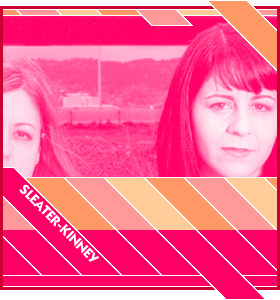Tatone: In my opinion, the vocals on the new record sound the best, I think, I've ever heard them. Do you hear improvement in the singing?
Weiss: Vocals, meaning the sound of them?
Tatone: Everything about them — all the singing, the overall feel. My first reaction was they just sounded better than ever before.
Weiss: Since I'm not one of the vocalists, I guess I should answer that. I don't think improved is necessarily the right word. I think it's adventurous vocally, successfully adventurous. The experiments really worked out. Carrie sings a lot more on this record and that flushed out a whole other perspective, like a richer sound. The two voices in combination paint the entire picture so it is very vocally rich, as opposed to one or the other one.
Tatone: I really like the song "Hollywood Ending," I like the lyrics. Could you talk about what it means or what inspired it, and the lines, "Can't get that monster out of my mind/ She's got my hair/ And she's got my eyes/ She follows me wherever I go"?
Brownstein: That song, which I originally wanted to call "Can't Get That Monster out of My Mind," is the title of a Joan Didion short story from her book, "Slouching Towards Bethlehem." That specific story is basically about Hollywood as a monster, an industry as a monster. And those that work for it are in the shadow of this entity that they will always be a slave to — you're sacrificing your own artistic merit for the greater good of the industry. So that was the overriding metaphor. But it posits a certain person, a woman in this world where there's a lot of emptiness. Do you nurture yourself in that environment? How do you even know who you are in that environment, when the way you're defined is coming from the outside, external forces? So that's the metaphor of that song.
Tatone: Is that what the book is about too?
Brownstein: No, just the idea of the song came from the short story. But, actually, the story takes place in this really arid landscape, which is a metaphor for the soul of somebody living in Hollywood, which is completely bereft of any wholeness or goodness, which is also what that song is about. Yes, it's inspired by Joan Didion, pretty much [laughing]. We wrote those — the lyrics at the end there — we basically had the break of that song, the lyrics in Hollywood, "All the lights are low...." That's what we had and we just wrote from there.
Weiss: Like seconds before going in.
Brownstein: Seconds before recording it [laughing]. But it turned out really well. We had a ton of practice lyrics and it turned out well, considering it saved the song actually, 'cause we were at a point where we had no idea. I also had to change my vocal melody of that song at the last minute. So it's interesting this song came together in a Frankenstein way and it has to do with monsters.
Friday, January 2, 2026 |
||

